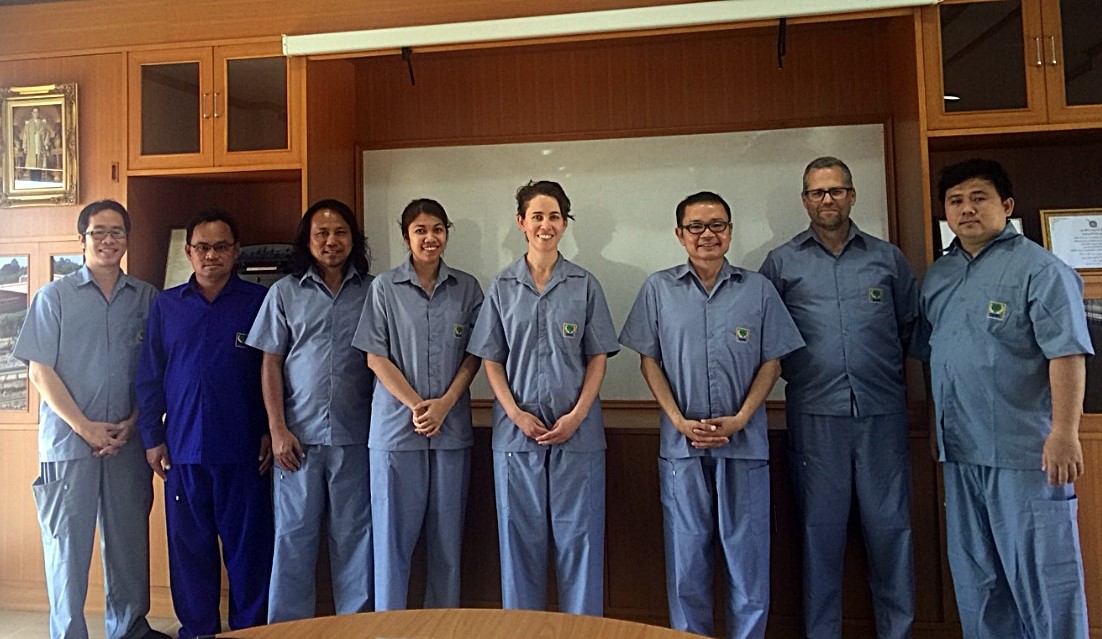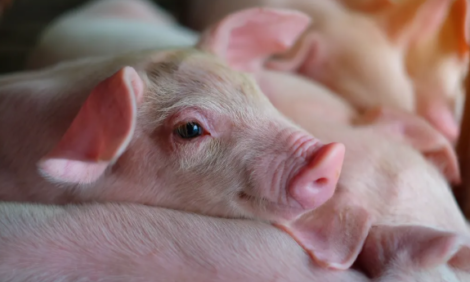



World Animal Protection visit CPF swine farm
Speaking to The Pig Site, Jaqueline Mills, Head of campaign for farming, World Animal Protection, explains the purpose of their recent visit to Charoen Popkhand’s swine farm at Sakaeo.
Representatives from World Animal Protection (WAP) including Darren Vanstone, Corporate Engagement Manager, Jacqueline Mills, Global Head of Campaign Farming, together with its staff in Bangkok jointly visited Charoen Pokphand Foods Plc (CPF)'s swine farm at Sakaeo. DVM Damnoen Chaturavittawong, Senior Vice President - Swine Veterinary Service of CPF, welcomed those visitors and exchanged views on the company's animal welfare policy, particularly the development of managing sow farms in line with international standard as well as group gestation pens.
Jaqueline Mills explains how WAP is working closely with pig producers to create tailored action plans for improving both welfare on-farm and their businesses.
What was the purpose of World Animal Protection’s meeting with Charoen Pokphand Foods’ farm?
CPF invited us to visit one of their pig farms to share learnings from our work with producers in some of the most important pork production markets globally. This is a step in the right direction and indicates to us that CPF is ready to show leadership on pig welfare.
World Animal Protection is working to improve the lives of farm animals globally and to do this we’re engaging some of the world’s biggest producers like CP Foods.
Despite the progress of leading companies, an estimated four out of five of the world’s sows still spend their lives confined in steel cages. These cages are no bigger than the average fridge, the sow is unable to turn around, root, explore, move comfortably, or socialise with other sows.
Wherever they are in the world, farm animals deserve a good life. They don’t deserve to be in pain, scared, bored and frustrated.
Our vision is for pig production systems globally to be built around the needs of pigs, so that they have good lives.
We’re working on a global pig campaign, because pigs don’t belong in cages or packed together in barren environments.
Change is possible, we have real and tangible solutions to improve the lives of pigs. Our experience working with companies like Betagro in Thailand and BRF in Brazil is that keeping sows in groups, not in cages, is good for animals and good for business.
What were the outcomes of this meeting?
CPF is considering its approach to farm animal welfare, and we discussed how we can help them to get there. We introduced to them our Pig Welfare Framework, which outlines our position on what constitutes unacceptable, acceptable and good pig welfare practice in indoor pig production. It includes a description of production practices and corresponding welfare outcomes.
Our Pig Welfare Framework has been developed under the leadership of our technical experts reviewing scientific evidence and independent private certification standards.
We also discussed international developments and experiences, and practical learnings with CPF.
We anticipate ongoing interaction and contribution as the company continues to develop its approach. We want CPF and other pig producers globally to make a public, time bound commitment to phase out the practice of keeping sows in cages during pregnancy, and instead to introduce group sow housing with provision of comfortable flooring and manipulable materials to allow for expression of natural behaviour.
We understand this can’t happen overnight, but we are ready to applaud any leading producers that come out with a clear roadmap and timeframe.
We would like producers to develop a transparent and comprehensive approach to addressing all aspects of the Pig Welfare Framework over time, and consider broader farm animal welfare in production where applicable.
Are more commercial meat companies working harder on improving animal welfare standards?
Around the world, people are increasingly concerned with the welfare of animals grown for food.
• 83% of people surveyed in China believe sows should be given room to move, not kept in cages
• More than three-quarters of people surveyed in China would change supermarkets to be able to buy higher welfare pork
We know once people become aware of practices like close confinement, barren environments, and painful procedures, they consider them cruel and unacceptable.
We are building a movement of people who want to see better lives for pigs and we are engaging across the supply chain to encourage positive change. Around the world, more than 60 brands have introduced policies requiring suppliers to end the use of cages.
Leading producers understand the trend towards increased interest in farm animal welfare, and there is an opportunity to integrate animal welfare measures into quality management systems that assure food safety.
Routine use of antibiotics is one example. In 2017, CPF announced its policy on responsible antimicrobial use. Leading producers understand that antibiotics should not be used indiscriminately as a band aid solution to propping up low welfare systems. Good animal management and welfare is part of the solution in effectively reducing antibiotic use and resistance.
Ultimately, World Animal Protection believes there’s a better way for pigs. Together we have the power to end suffering, by getting pigs out of cages into groups, giving them materials like straw to manipulate, and stop mutilations; so, pigs can be pigs and live pain-free, move, play, root, explore, socialise and experience natural behaviour.
For more information about the work of World Animal Protection click here









